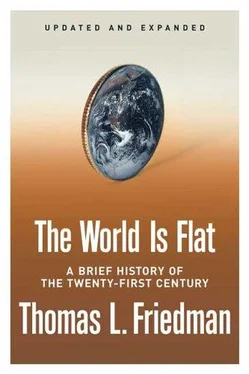“There are two things that worry me right now,” said Richard A. Rashid, the director of research for Microsoft. “One is the fact that we have really dramatically shut down the pipeline of very smart people coming to the United States. If you believe that we have the greatest re-seach universities and opportunities, it all has to be driven by IQ. In trying to create processes that protect the country from undesirables, [the government] has done a much better job of keeping out desirables. A really significant fraction of the top people graduated from our universities [in science and engineering] were not born here, but stayed here and created the businesses, and became the professors, that were engines for our economic growth. We want these people. In a world where IQ is one of the most important commodities, you want to get as many smart people as you can.”
Second, said Rashid, “We have done a very poor job of conveying to kids the value of science and technology as a career choice that will make the world a better place. Engineering and science is what led to so many improvements in our lives. But you talk to K through twelve kids about changing the world and they don't look at computer science as a career that is going to be a great thing. The amazing thing is that it is hard to get women into computer science now, and getting worse. Young women in junior high are told this is a really wretched lifestyle. As a result, we are not getting enough students through our systems who want to be computer scientists and engineers, and if we cut off the flow from abroad, the confluence of those two will potentially put us in a very difficult position ten or fifteen years from now. It is a pipeline process. It won't come to roost right away, but fifteen or twenty years from now, you'll find you don't have the people and the energy in these areas where you need them.”
From Richard Rashid at Microsoft in the Northwest to Tracy Koon at Intel in Silicon Valley to Shirley Ann Jackson at Rensselaer on the East Coast, the people who understand these issues the best and are closest to them have the same message: Because it takes fifteen years to create a scientist or advanced engineer, starting from when that young man or woman first gets hooked on science and math in elementary school, we should be embarking on an all-hands-on-deck, no-holds-barred, no-budget-too-large crash program for science and engineering education immediately. The fact that we are not doing so is our quiet crisis. Scientists and engineers don't grow on trees. They have to be educated through a long process, because, ladies and gentlemen, this really is rocket science.
EIGHT: This Is Not a Test
We have the power to shape the civilization that we want. But we need your will, your labor, your hearts, if we are to build that kind of society. Those who came to this land sought to build more than just a new country. They sought a new world. So I have come here today to your campus to say that you can make their vision our reality. So let us from this moment begin our work so that in the future men will look back and say: It was then, after a long and weary way, that man turned the exploits of his genius to the full enrichment of his life.
—“Great Society” speech, Lyndon B. Johnson, 1964
As a person who grew up during the Cold War, I'll always remember driving along down the highway and listening to the radio, when suddenly the music would stop and a grim-voiced announcer would come on the air and say, “This is a test of the emergency broadcast system,” and then there would be a thirty-second high-pitched siren sound. Fortunately, we never had to live through a moment in the Cold War where the announcer came on and said, “This is not a test.” That, however, is exactly what I want to say here: This is not a test.
The long-term opportunities and challenges that the flattening of the world puts before the United States are profound. Therefore, our ability to get by doing things the way we've been doing them-which is to say, not always tending to our secret sauce and enriching it-will not suffice anymore. “For a country as wealthy as we are, it is amazing how little we are doing to enhance our natural competitiveness,” said Dinakar Singh, the Indian-American hedge fund manager. “We are in a world that has a system that now allows convergence among many billions of people, and we had better step back and figure out what it means. It would be a nice coincidence if all the things that were true before are still true now-but there are quite a few things you actually need to do differently... You need to have a much more thoughtful national discussion.” The flat world, Singh argued, is now the elephant in the room, and the question is, What is it going to do to us, and what are we going to do to it?
If this moment has any parallel in American history, it is the height of the Cold War, around 1957, when the Soviet Union leaped ahead of America in the space race by putting up the Sputnik satellite. Yes, there are many differences between that age and our own. The main challenge then came from those who wanted to put up walls; the main challenge to America today comes from the fact that all the walls are being taken down, and other countries can now compete with us much more directly. The main challenge in that world was from those practicing extreme communism, namely, Russia, China, and North Korea. The main challenge to America today is from those practicing extreme capitalism, namely, China, India, and South Korea. The main objective in that era was building a strong state; the main objective in this era is building strong individuals.
What this era has in common with the Cold War era, though, is that to meet the challenges of flatism requires as comprehensive, energetic, and focused a response as did meeting the challenge of communism. It requires our own version of the New Frontier and Great Society adapted to the age of flatness. It requires a president who can summon the nation to get smarter and study harder in science, math, and engineering in order to reach the new frontiers of knowledge that the flat world is rapidly opening up and pushing out. And it requires a Great Society that commits our government to building the infrastructure, safety nets, and institutions that will help every American become more employable in an age when no one can be guaranteed lifetime employment. I call my own version of this approach compassionate flatism.
Getting Americans to rally around compassionate flatism is much more difficult than getting them to rally around anticommunism. “National peril is a lot easier to convey than individual peril,” noted Johns Hopkins University foreign policy expert Michael Mandelbaum. Economics, as noted, is not like war, because economics can always be a win-win game. But sometimes I wish economics were more like war. In the Cold War, we actually got to see the Soviets parade their missiles in Red Square. We all got to be scared together, from one end of the country to the other, and all our politicians had to be focused and serious about marshaling the resources and educational programs to make sure Americans could keep pace with the Soviet Union.
But today, alas, there is no missile threat coming from India. The “hot line,” which used to connect the Kremlin with the White House, has been replaced by the “help line,” which connects everyone in America to call centers in Bangalore. While the other end of the hotline might have had Leonid Brezhnev threatening nuclear war, the other end of the help line just has a soft voice eager to help you sort out your AOL bill or collaborate with you on a new piece of software. No, that voice has none of the menace of Nikita Khrushchev pounding a shoe on the table at the UN, and it has none of the sinister snarl of the bad guys in From Russia with Love. There is no Boris or Natasha saying “We will bury you” in a thick Russian accent. No, that voice on the help line just has a friendly Indian lilt that masks any sense of threat or challenge. It simply says: “Hello, my name is Rajiv. Can I help you?”
Читать дальше












